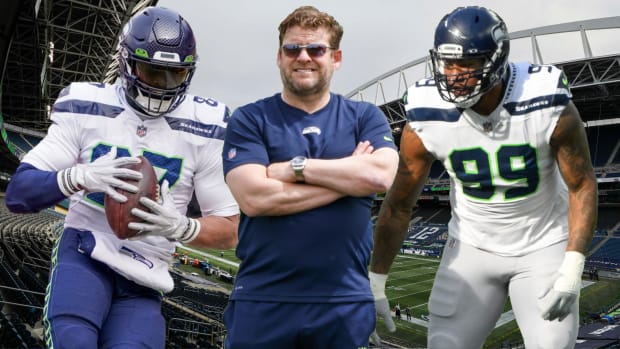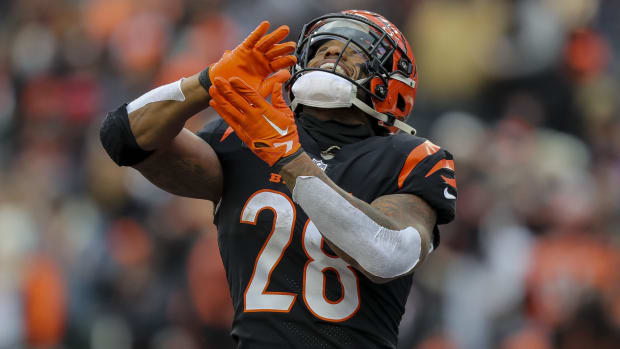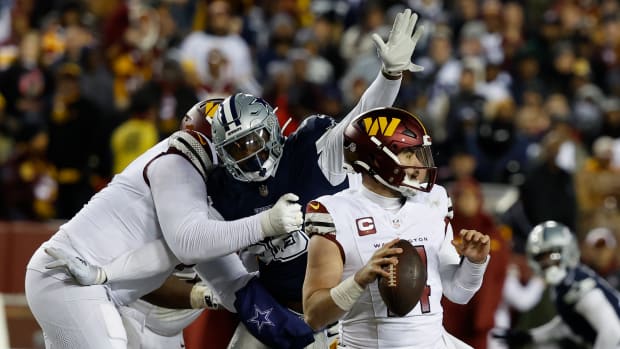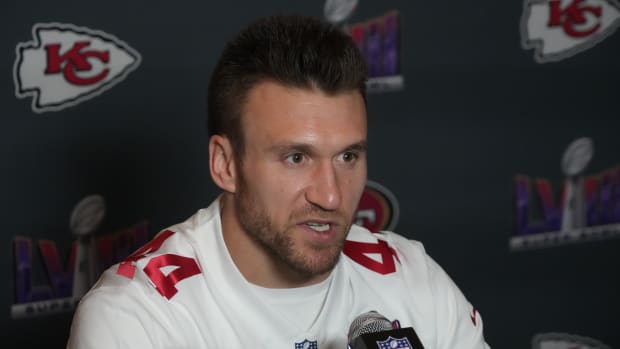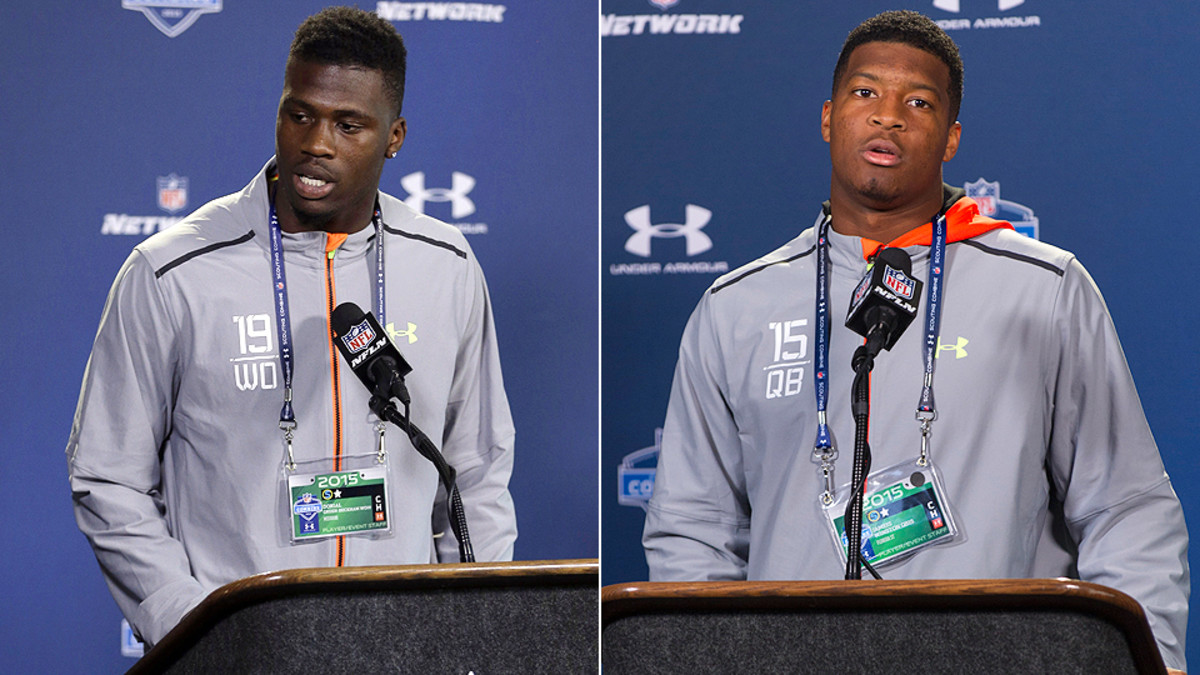
When it comes to NFL draft, character matters, but talent matters most
INDIANAPOLIS—After multiple scandals rocked the NFL to its core last season, player character is seemingly the most-discussed topic at the 2015 NFL combine. Teams are clearly on-guard when it comes to the entry of any player with a questionable past. Several of the players projected to go in the first round of the NFL draft, including QB Jameis Winston and WR Dorial Green-Beckham, have dealt with widely publicized incidents, bringing the issue even more into the spotlight.
• SI.com's complete coverage of the 2015 NFL scouting combine
Green-Beckham brings troubled past to draft process at the worst time
At the 2013 NFL combine, Cardinals' coach Bruce Arians saw LSU defensive back Tyrann Mathieu nail all his interviews and drills just months after Mathieu's dismissal from school following several drug-related incidents, and Arizona ultimately took a chance on a player who seemed truly repentant. That decision has paid serious dividends—when healthy, Mathieu has been a game-changing player, and he's kept his nose clean in the pros. With LSU alum Patrick Peterson on the roster, the Cardinals had the makings of a support system in place, and Mathieu checked all the right boxes. Arizona's pick was more of an educated risk than throwing caution to the wind for the sake of a captivating physical talent.
"This is the first step," Arians said Thursday at the combine. "Because in 15 minutes, it’s hard, and they are programmed to answer the right questions. The big thing is to get another chance to stun them, and hit them with a question they aren’t programmed to answer. You get a feel for a guy. Does he have the passion? Does he really want to do the right thing? It’s different for whatever issue you have, it’s different to see the future on how they will stay away from the problem or is the problem going to reoccur?
"He went through his rehab process and was genuinely passionate about the game. Giving up the game killed him. You could see it in him. We also knew we had a great support system with Patrick and we drafted Kevin Minter. So he could be successful, and he’s done a fine job."
•BEDARD: Bucs drafting Winston over Mariota? Watch out for the bluff
Bucs general manager Jason Licht, who was the Cardinals' VP of player personnel in 2013 when they drafted Mathieu, is in a similar situation this season. Tampa Bay has the No. 1 pick in the draft, with the option to choose Winston, whose off-field issues have been well-publicized.
"We are using a lot of resources—a lot—to dig into every player’s background, some more than others," Licht said. "I don’t want to get into the whole process here, but the fans can know that we will have, for lack of using the cliché, crossed every 'T' and dotted every 'I' before we make the decision. And keep in mind, our head coach is one of the finest human beings I have ever met, inside or outside of football. Character is very important to him, it’s very important to me, so we will make sure that the decision we make is best for the Tampa Bay Buccaneers."
And that's where the disconnect will always be—sometimes, what's best for the team is to take these risky players who have the ability to turn a franchise around, and never look back.
How NFL teams evaluate great receivers with bad quarterbacks
Bucs coach Lovie Smith, who is universally recognized as one of the NFL's good guys, has been as careful as possible with the Winston conundrum, though saying that he would be comfortable making Winston the face of the franchise. And with the first overall pick, Smith and Licht have the power to do exactly that.
“Right now, with the information that we have... I understand the allegations against him," Smith said. "I understand the college things a lot of guys do that you wish you wouldn’t later on. I understand some of the things that he did that are on his record right now. We just take all the information that we can possibly get right now."
Coaches and GMs are going to closely examine players like Winston and Green-Beckham because they're not only trying to get ahead in a brutally competitive league, but also they'd like to keep their jobs. The acquisition and management of risky players is one of the surest ways to improve your team, if you do it right. Teams will care about what these guys do "personal-wise," but in the end, it's all about their ability. A player like Michigan defensive end Frank Clark could be deemed undraftable with his history of domestic violence, because Clark was a mid-round prospect to start.
• KLEMKO: The combine's real value comes behind the scenes in interviews
When he faced the media on Friday morning, Clark did absolutely nothing to help himself, indulging in a mistaken bit of victim-blaming after starting his media session by saying the usual stuff about counseling and learning from his mistakes.
"You can say, 'Well, I didn't do anything.' I can plead not guilty all I want," Clark said. "But at the end of the day, when you look at domestic violence, you don't look at a 270-pound man—you don't go, 'Well, did she hit him, or did he hit her?' You don't look at it that way. Domestic violence, you automatically assume the man had something to do with it. That's usually how the world goes. That's how our society is set up."
Another way our society works—when you get dismissed from a major college program because you allegedly punch your girlfriend in the face, grab her by the neck and slam her to the ground, you should have quite a bit of explaining to do. As it should be.
Will Mariota be able to prove that he's more than just a spread-offense QB?
But Green-Beckham and Winston are on the upper edge of that curve, and their lines of demarcation are much filmier when it comes to how much teams will accept. Both players have had a chance to discuss their situations in front of the media at the combine, and they will surely dig into it further in team interviews.
Chiefs GM John Dorsey, whose team went the entire 2014 season without a touchdown pass to a wide receiver, has Green-Beckham very much on his radar.
"Physically, we think he has all the gifts in the world," Dorsey said Thursday. "I think now what people want to do is get a feel for him as a person, see where he is at this state. Just see where he is, that’s what we are doing. We will be meeting him in the next couple days and I look forward to it."
The Browns found out the hard way how the inability to handle such players can damage a team to an extreme degree. After extensively studying the quarterbacks in the 2014 draft, Cleveland picked Johnny Manziel, and for their trouble, they got a skittish, unprepared quarterback who's currently in rehab to deal with his personal issues. Given Manziel's "YOLO" history at Texas A&M, Browns GM Ray Farmer's recent contentions that Manziel's season came as a surprise didn't exactly put Farmer in a good light.
Winston was asked about the comparison to Manziel, and how the Manziel drama may have impacted the ways in which NFL teams look at these types of players.
"I can't speak on behalf of another player, because I'm a different person—I'm Jameis Winston," he said. But I am here to say that I want to gain the trust of all 32 [NFL] teams. My actions. We'll see in a year. You can't predict the future; I can't predict the future. But what I can do is what I need to do to be the face of a franchise."
After suffering a late-season injury, will teams take a chance on Ogbuehi?
On Thursday, Farmer discussed what teams try to learn about draft prospects at the combine, with a little shot of defensiveness regarding Manziel and their other first-round pick in 2014, cornerback Justin Gilbert, who found himself benched over attitude issues in his rookie campaign.
"I think the combine and the interviews and all of it, I think all comes back to one thing, is trying to uncover information," Farmer said. "As you get the information that you get, how you dissect it and what you look at is a different part of that process. I will say we’ve made changes, we made our adjustments and I think we’ll be more prepared this year because of the different timeframe of me having the position for a year now instead of getting that appointment late February last year."
Farmer had to answer the Manziel question all over again: How could you swing and miss this wildly, when that information was out there?
"We understood what people would call red flags. We made that decision as a Browns organization. Inevitably that does fall to me because I’m the general manager and I make that selection, but we knew what those were, and good for him that he stepped up and said I need help and is going to get that help."
Asked how the Browns might change their modus operandi going forward, Farmer referred to the experience factor, which isn't all that relevant when you're the one in charge of those risky picks -- no matter how you come to know about prospects, you'd better figure it out -- especially if you're prone to taking those risks more than other teams.
Brett Hundley out to prove this QB draft class is better than perceived
"Without giving what you may consider a competitive advantage or giving people insight as to what you do in the process, I do think that it’s all about recovering information and trying to create better relationships and bonds. inevitably everybody has a piece to this puzzle, so you only get information from the people that are willing to share it with you. so the information that you get, you’ve got to be resolute as to what that is and how that comes about. so adding experience to our scouting staff -- I think was a major part of that. guys have existing relationships, longstanding relationships, you feel you get a better take as to what you’re getting in the quality of that information."
As former NFL scout Bryan Broaddus recently wrote, "My thought has always been that if I didn’t take a kid, somebody else would and they would beat me with that player. As crazy as that might sound, it's the honest truth."
It's the honest truth for every NFL team, and that fear will outdo the hesitancy directed at any high-risk player. No matter how vigilant the NFL wants to be about such players, that's the way it will always be.

































